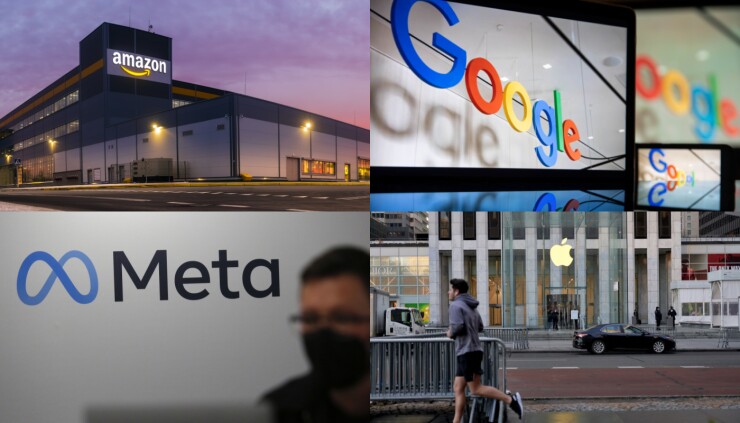
The Consumer Financial Protection Bureau faces stiff opposition from Big Tech firms on its plan to supervise
CFPB Director Rohit Chopra has repeatedly warned about the expanding reach of large technology companies and how they have
The CFPB received
"This is the first step in the CFPB getting authority to look under the hood on an ongoing basis and take steps to correct any shortcomings in the market," said Adam Rust, director of financial services at the Consumer Federation of America.
The CFPB said that the rule would apply to at least 17 of 190 potential companies in the large participant universe, though it did not mention any by name. Experts have been compiling their own lists, which include Alphabet Inc.'s Google, Amazon, Apple, Block — which owns Square and Cash App — Meta Platforms and PayPal, which owns Venmo, among others.
Big Tech companies and fintechs said in comment letters that the CFPB failed to identify the dangers to consumers from specific markets and to conduct a cost-benefit analysis as required by law. The Computer & Communications Industry Association, whose members include Amazon, Meta and X, said the CFPB had failed to provide reasons why smartphone payments and wallet services were risky to consumers.
"Despite having studied the market for nonbank digital consumer payment apps through extensive market monitoring orders, the CFPB has not issued a report or pointed to other evidence that this purported market presents any such risks to consumers," wrote Krisztian Katona, a CCIA lobbyist. "It is paramount for the CFPB to carefully determine if there is a market failure or a risk for consumers that requires this additional regulation."
The proposed rule follows recent complaints against digital payment apps, including a CFPB report issued last year detailing

Still, legal experts argue that the CFPB created too broad a proposal in its effort to capture Big Tech firms instead of just third-party payment processors. By doing so, some legal experts think the CFPB has opened itself to a legal challenge that the rule is arbitrary under the Administrative Procedure Act.
"There is no such thing as a general-use digital consumer payment market," said James Kim, a partner at the law firm Troutman Pepper, which represents TechNet, a group of senior executives and technology CEOs.
TechNet is one of several commenters to claim that the CFPB bypassed a congressional requirement to consult with the Federal Trade Commission. The bureau said cryptically in its proposal that it had "consulted with or provided an opportunity for consultation" with the FTC in creating the proposed rule. However, the statutory requirement is that the CFPB "shall consult" with the FTC, leaving it unclear whether the bureau met its obligation to confer with the FTC,
The upshot is that the CFPB's proposal, if left unchanged without addressing the alleged shortcomings, could result in Big Tech companies litigating against the rule on a number of procedural grounds.
"The CFPB should pause the rulemaking process, reconsider the Proposed Rule in its entirety, and conduct the analysis required by the Act," wrote Penny Lee, CEO of the Financial Technology Association, which represents Block, PayPal and others.
FTA led a number of trade groups in calling for the CFPB to extend the comment period on its proposal by 30 days — a request that went unheeded by the CFPB. A final larger participant rule is expected to be completed by year-end, and could arrive close to the presidential election, subjecting it to reversal if there were to be a change in administration.
Big Tech companies and fintechs also argue that payment providers should not be subjected to CFPB supervision because they are already licensed and supervised by states and, in some cases, as third-party service providers, they may be subject to federal supervision or oversight by banks and other financial institutions.
Though industry generally wants to narrow the rule, many fintech commenters asked for a broader definition of larger participants. The CFPB defines larger participants as companies that process more than 5 million payment transactions and are not considered small businesses as defined by the Small Business Administration.
The Consumer Bankers Association and American Bankers Association support regulated large nonbanks, though the groups recommended that the CFPB
"The topic of digital asset supervision is larger than consumer protections for payments and should be subject to its own comprehensive public comment and debate process instead of being shoehorned into this rulemaking," ABA and CBA said.
Jeff Patchen, a lobbyist at the Electronic Transactions Association, estimated that the trade group's members that include large banks, credit card issuers and a broad range of tech firms such as Google, Square, Fiserv and PayPal, collectively process roughly
"ETA does not believe bringing digital assets into Regulation E is thoughtful without explicit feedback from the industry and consumers given the broad implications of determining where digital assets are "funds" rather than securities or commodities," wrote Patchen.
Consumer advocates also have asked for the CFPB to include other companies and products for oversight such as release cards issued by prisons and correctional facilities that charge high fees but may have fewer consumer protections. Other consumer advocates want the CFPB to include banking apps and prepaid cards in its rule.
"We're worried about the incursion of Big Tech into financial services," said Rust. "Supervision is good for markets in general by making products safer and leveling the playing field."





